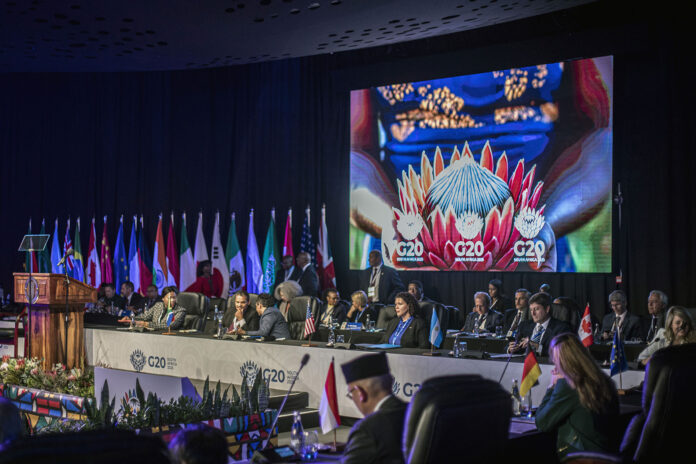The G20 Leaders’ Declaration has been unusually adopted on the first day of the leaders’ summit despite the absence of the United State of America (USA).
The USA boycotted the two-day summit and opted to send a charge d’affaires for the handover ceremony.
“We affirm our unwavering commitment to act in accordance with international law, including international humanitarian law and the Charter of the United Nations and its principle of peaceful settlement of disputes and in this regard, we condemn all attacks against civilians and infrastructure.
“We further reaffirm that in line with the UN Charter, all states must refrain from the threat or use force to seek territorial acquisition against the territorial integrity and sovereignty or political independence of any state and that states should develop friendly relations among nations, including by promoting and encouraging respect for human rights and for fundamental freedoms for all without distinction to race, sex language, or religion,” the declaration reads.
Concern for heavily indebted nations
The declaration conveyed a message of support for low-income nations facing heavy debt pressures. G20 countries agreed to take action to ensure debt sustainability for low-income countries, saying high debt costs are blocking development and stability in many parts of the world.
Leaders said the high-level debt was an obstacle to inclusive growth in developing countries and that many governments cannot invest properly in infrastructure, disaster resilience, healthcare, education and other development needs.
Although the G20 believes the risk of a global debt crisis is broadly contained, it warned that many vulnerable low- and middle-income countries face high financing costs, need for external financing, and greater outflow of private capital.
The declaration highlights that the situation is challenging for many low-income countries, especially in Africa, and raised concern that interest payments on external public debt “have increased significantly and have more than doubled over the past decade for low-income countries (LICs)”.
“We reaffirm our commitment to support efforts by low- and middle-income countries to address debt vulnerabilities in an effective, comprehensive and systematic manner. We endorse the G20 Ministerial Declaration on Debt Sustainability by our Finance Ministers at their October meeting, which provides a basis for concrete action to advance this commitment,” the declaration continues in part.
Borrowing nations must be heard
The signatories also repeated support for improving the G20 Common Framework for debt treatment, calling for it to work in a predictable, timely, orderly, and coordinated manner.
The declaration highlighted the need for transparency. It further promises ongoing dialogue between debtor nations and all creditors, saying: “We remain committed to engaging constructively with key stakeholders. It is important to engage with and enhance the voice of borrower countries.”
Leaders further urged the international community to help countries that have sustainable debt but are facing liquidity problems. They said these solutions should be country-specific and voluntary, and requested the IMF and World Bank to continue exploring practical support options.
“We underscore the importance of addressing gaps in debt management, debt transparency, public financial management, and domestic resource mobilisation,” reads the declaration.



